
Iranian Classics
This year, Iran and Iranian cinema plays an important role at our festival. Iran has a rich film history and is ranked among the best cinema in the world. In recent years, several Iranian-made films have won awards at major film festivals. Iranian art films often cannot be shown in their own country, which makes it vital that festivals like ours provide space for them.
That’s why this year we are bringing some Iranian classics back to the big screen and you get to help decide. We have compiled a longlist of films that we think Dutch audiences should have seen (or re-watch) on the big screen.
You can cast your vote until Wednesday 1 February using the form below. The three films with the most votes will be screened at the Movies that Matter Festival 2023, 24 March to 1 April in The Hague. Read more about the films you can choose from via the drop-down menu at the bottom of the page.
Voting Form
The ballot box is closed. We will soon announce the three chosen films.
Films
-
Bashu: The Little Stranger
Bahram Bayzai, 1989
 Little Bashu loses his home and family in an raid and instinctively flees to a region far away from the battle fronts.
In this alien environment everything seems strange to the boy. Naï, a woman whose husband has gone on a journey, finds Bashu in her farm and gives him shelter. After Bashu tells her of his past life, Naï accepts him as a son and tries to initiate him into the ways of life in the region.
Little Bashu loses his home and family in an raid and instinctively flees to a region far away from the battle fronts.
In this alien environment everything seems strange to the boy. Naï, a woman whose husband has gone on a journey, finds Bashu in her farm and gives him shelter. After Bashu tells her of his past life, Naï accepts him as a son and tries to initiate him into the ways of life in the region. -
The Circle
Jafar Panahi, 2000
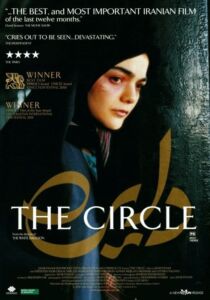 Jafar Panahi’s third feature focuses on the plight of women in Iran. In The Circle, Panahi portrays eight women, all in extreme situations. They have just come out of prison, are desperately trying to arrange an illegal abortion or are trying to live as prostitutes. Even something as innocent as smoking a cigarette on the street can get you into trouble. Women’s lives seem to unfold in a circular progression, whose beginning and end are determined by invariably suffocating living conditions.
Jafar Panahi’s third feature focuses on the plight of women in Iran. In The Circle, Panahi portrays eight women, all in extreme situations. They have just come out of prison, are desperately trying to arrange an illegal abortion or are trying to live as prostitutes. Even something as innocent as smoking a cigarette on the street can get you into trouble. Women’s lives seem to unfold in a circular progression, whose beginning and end are determined by invariably suffocating living conditions. -
The Cow
Dariush Mehrjui, 1969
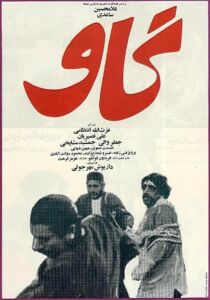 Hassan’s most valuable possession is his cow. At the same time, it is the only cow in the village. But when Hassan has to leave for a short while, the pregnant animal is found dead in its shed. The villagers try to cover up the incident when Hassan returns, claiming the cow has run away. The animal’s disappearance leads to Hassan losing first his social standing and then his mind. He’s now convinced he is a cow. The film was only approved by the Iranian censor after an introductory sequence had been added, setting the poverty portrayed in a time decades earlier. The Cow is seen as one of the most important Iranian films ever made.
Hassan’s most valuable possession is his cow. At the same time, it is the only cow in the village. But when Hassan has to leave for a short while, the pregnant animal is found dead in its shed. The villagers try to cover up the incident when Hassan returns, claiming the cow has run away. The animal’s disappearance leads to Hassan losing first his social standing and then his mind. He’s now convinced he is a cow. The film was only approved by the Iranian censor after an introductory sequence had been added, setting the poverty portrayed in a time decades earlier. The Cow is seen as one of the most important Iranian films ever made. -
Close-Up
Abbas Kiarostami, 1990
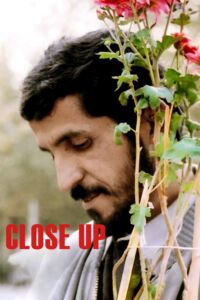 Hossein Sabzian is a fanatical film buff who deceives a family into believing he is the popular Iranian film director Mohsen Makhmalbaf. He promises to give the eldest son a leading role in his next film and discusses with the husband which trees should be removed in order to get better shots of the house. At first, the family is pleased to meet the man and they feel honored by his attention, but they eventually grow suspicious. A journalist friend exposes the lie and the police arrest Hossein Sabzian for fraud. Just as reality and film are jumbled in Hossein Sabzian’s life, Close-up is set on the border between fiction and documentary. The film includes footage of the impostor’s trial and dramatizations of the events leading up to it. Because all the characters play themselves, it is hard to tell where reality ends and fiction begins. Director Abbas Kiarostami’s style of filming keeps up constantly aware of the presence of the camera and its influence on what is unfolding before us. The boundary between film and reality, between fiction and documentary, is blurrier than we sometimes think.
Hossein Sabzian is a fanatical film buff who deceives a family into believing he is the popular Iranian film director Mohsen Makhmalbaf. He promises to give the eldest son a leading role in his next film and discusses with the husband which trees should be removed in order to get better shots of the house. At first, the family is pleased to meet the man and they feel honored by his attention, but they eventually grow suspicious. A journalist friend exposes the lie and the police arrest Hossein Sabzian for fraud. Just as reality and film are jumbled in Hossein Sabzian’s life, Close-up is set on the border between fiction and documentary. The film includes footage of the impostor’s trial and dramatizations of the events leading up to it. Because all the characters play themselves, it is hard to tell where reality ends and fiction begins. Director Abbas Kiarostami’s style of filming keeps up constantly aware of the presence of the camera and its influence on what is unfolding before us. The boundary between film and reality, between fiction and documentary, is blurrier than we sometimes think. -
The Day I Became a Woman
Marzieh Meshkini, 2000
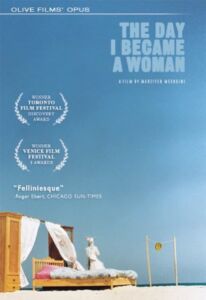 Three interconnected vignettes depict women of various generations at turning points in their lives. A girl reaches the age of nine and is supposed to act as a grown woman according to her family. A girl participates in a bike race against the will of her husband. An elderly woman decides she wants to buy all the things she always wanted but could never get.
Three interconnected vignettes depict women of various generations at turning points in their lives. A girl reaches the age of nine and is supposed to act as a grown woman according to her family. A girl participates in a bike race against the will of her husband. An elderly woman decides she wants to buy all the things she always wanted but could never get. -
Gabbeh
Mohsen Makhmalbaf, 1996
 On the banks of a stream, an old woman and her husband are washing their Gabbeh. From this carpet comes forth a young woman – aptly named Gabbeh – who shares her epic tale: she is desperately in love with a mysterious horseman who follows her clan from after. Though her father has agreed to let her marry the man, season after season, the horseman follows Gabbeh—always present, always waiting, howling songs of love after nightfall.
On the banks of a stream, an old woman and her husband are washing their Gabbeh. From this carpet comes forth a young woman – aptly named Gabbeh – who shares her epic tale: she is desperately in love with a mysterious horseman who follows her clan from after. Though her father has agreed to let her marry the man, season after season, the horseman follows Gabbeh—always present, always waiting, howling songs of love after nightfall. -
A Girl Walks Home Alone at Night
Ana Lily Aminpour, 2014
 In the shadows of Bad City, a girl wanders around. In a chador and striped t-shirt, dodging the streetlights, she stalks villagers. When necessary, she shows her vampire teeth to the residents of Bad City, a lawless hole full of underworld figures, drug addicts and pimps. Walking home alone one night, she meets Arash, an Iranian James Dean lookalike complete with classic American car and a fag in the corner of his mouth. In the dead of night, sparks fly between them.
In the shadows of Bad City, a girl wanders around. In a chador and striped t-shirt, dodging the streetlights, she stalks villagers. When necessary, she shows her vampire teeth to the residents of Bad City, a lawless hole full of underworld figures, drug addicts and pimps. Walking home alone one night, she meets Arash, an Iranian James Dean lookalike complete with classic American car and a fag in the corner of his mouth. In the dead of night, sparks fly between them. -
No One Knows About Persian Cats
Bahman Ghobadi, 2009
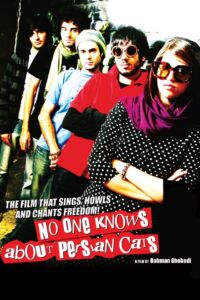 Negar and Ashkan, two young Iranian pop musicians end up in prison for playing western music. After their release they think up a plan to escape their chained existence. To realise their dream of performing in Europe, they roam Tehran’s underground rock scene trying to recruit other band members. Tehran as we have never seen it before. Much-acclaimed Iranian Kurd director Bahman Ghobadi recorded his music film last year without the required permission, in just two weeks and with terror in his heart. He used an S12K camera, since all 35mm cameras are state-owned. No permission means no film, and no permission means no music.
Negar and Ashkan, two young Iranian pop musicians end up in prison for playing western music. After their release they think up a plan to escape their chained existence. To realise their dream of performing in Europe, they roam Tehran’s underground rock scene trying to recruit other band members. Tehran as we have never seen it before. Much-acclaimed Iranian Kurd director Bahman Ghobadi recorded his music film last year without the required permission, in just two weeks and with terror in his heart. He used an S12K camera, since all 35mm cameras are state-owned. No permission means no film, and no permission means no music. -
Persepolis
Vincent Paronnaud, Marjane Satrapi, 2007
 In the successful four-part graphic novel Persepolis, Paris-based Marjane Satrapi describes her childhood in Iran – first in relative freedom under the shah, then increasingly repressed after the Islamic revolution. As a teenager, she is sent to Europe by her parents, but she cannot ground herself in Western culture either. Satrapi himself co-directed this film adaptation, which retains both the story and the effectively simple drawing style of the comic. The result is an overwhelming ode to universal childhood dreams, resilience and fantasy.
In the successful four-part graphic novel Persepolis, Paris-based Marjane Satrapi describes her childhood in Iran – first in relative freedom under the shah, then increasingly repressed after the Islamic revolution. As a teenager, she is sent to Europe by her parents, but she cannot ground herself in Western culture either. Satrapi himself co-directed this film adaptation, which retains both the story and the effectively simple drawing style of the comic. The result is an overwhelming ode to universal childhood dreams, resilience and fantasy. -
The President
Mohsen Makhmalbaf, 2014
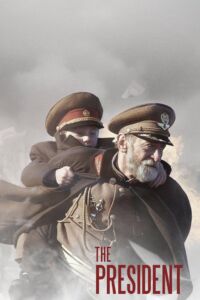
In an unidentified country an old dictator boasts to his grandson about his power. He shows the boy how he can have all the lights in the city turned off with just one phone call. Another phone call and the lights come back on. Looking out over the city from the presidential palace, the boy picks up the phone and asks to turn the lights off and back on. It works!
But when rebels throw a coup, there is a price on the head of the dictator. He is forced to flee together with his grandson. Disguised as street musicians they travel across the country, heading for the coast. On their way, the former dictator comes face to face with people who have suffered from violence, poverty and oppression under his reign.
-
A Separation
Asghar Farhadi, 2011
 Nader’s wife wants to leave Iran with him and their daughter Termeh. She has already arranged everything and is eager to start a new life abroad. Nader, however, has his reservations. He is worried about his demented father and does not want to leave him to his fate. He therefore decides that the family should stay at home. His wife Simin disagrees and refuses to live with him any longer. She leaves for her mother, leaving Nader and Termeh alone. Nader has difficulty coping with this new situation and hires a young woman to look after his ailing father. He is only unaware that his new help is not only pregnant, but also working without her husband’s permission. Nader soon finds himself caught in a web of lies, manipulation and confrontations.
Nader’s wife wants to leave Iran with him and their daughter Termeh. She has already arranged everything and is eager to start a new life abroad. Nader, however, has his reservations. He is worried about his demented father and does not want to leave him to his fate. He therefore decides that the family should stay at home. His wife Simin disagrees and refuses to live with him any longer. She leaves for her mother, leaving Nader and Termeh alone. Nader has difficulty coping with this new situation and hires a young woman to look after his ailing father. He is only unaware that his new help is not only pregnant, but also working without her husband’s permission. Nader soon finds himself caught in a web of lies, manipulation and confrontations. -
Taste of Cherry
Abbas Kiarostami, 1997
 Middle-aged Mr. Badii wishes to die in a society where suicide is considered an abomination. Driving in the hills above Tehran, he searches for an accomplice who is willing to bury him after he is dead. He meets an assortment of different characters, but each have reasons to turn down the job.
Middle-aged Mr. Badii wishes to die in a society where suicide is considered an abomination. Driving in the hills above Tehran, he searches for an accomplice who is willing to bury him after he is dead. He meets an assortment of different characters, but each have reasons to turn down the job. -
Taxi Teheran
Jafar Panahi, 2015
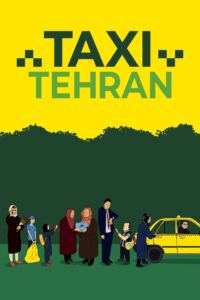 A yellow cab is driving through the vibrant and colorful streets of Tehran. Very diverse passengers enter the taxi, each candidly expressing their views while being interviewed by the driver who is no one else but the Iranian director Jafar Panahi himself. His camera placed on the dashboard of his mobile film studio captures the spirit of Iranian society through this comedic and dramatic drive.
A yellow cab is driving through the vibrant and colorful streets of Tehran. Very diverse passengers enter the taxi, each candidly expressing their views while being interviewed by the driver who is no one else but the Iranian director Jafar Panahi himself. His camera placed on the dashboard of his mobile film studio captures the spirit of Iranian society through this comedic and dramatic drive. -
This is Not a Film
Jafar Panahi, 2011

“How can I really express myself, within these boundaries and with the lines I have drawn? How can I convey the sense and the emotion that are inherent to these type of films? It is impossible, says internationally renowned Iranian filmmaker Jafar Panahi (The Circle, The White Balloon). He watches scenes from previous movies with a feeling of frustration, while against his better judgment he tries to visualize his new film on a carpet in his home. He takes care of his daughter’s iguana, takes ordered meals at the front door and puts his household waste by the side of the street. He watches the latest news bulletins and from his balcony looks out on the world to which he has been denied access. This Is Not a Film shows one day in the life of the isolated filmmaker and is a tribute to Iranian directors who are disallowed the right to work by the Iranian regime.
-
Turtles Can Fly
Bahman Ghobadi, 2004
 The unsurpassed film Turtles Can Fly by Iranian Kurd director Bahman Ghobadi is set in a refugee camp at the border between Iraq and Turkey, just before the American invasion of Iraq in 2003. The adults are desperately looking for a satellite receiver to keep them posted on the impending attack on Iraq. That’s where 13-year-old Kak ‘Satellite’ comes in. He is the uncontested leader of the children in the camp and under his command the children organize dangerous games, like defusing landmines and digging up unexploded ammunition that they sell to the authorities. Henkov, who lost both hands when he stepped on a landmine, is a boy with the gift of prophecy. He looks after his pretty sister Argin and an infant boy that may be her son. obsessed by the beauty of Argin, group leader Satellite tries to win the favours of the close-knit trio.
The unsurpassed film Turtles Can Fly by Iranian Kurd director Bahman Ghobadi is set in a refugee camp at the border between Iraq and Turkey, just before the American invasion of Iraq in 2003. The adults are desperately looking for a satellite receiver to keep them posted on the impending attack on Iraq. That’s where 13-year-old Kak ‘Satellite’ comes in. He is the uncontested leader of the children in the camp and under his command the children organize dangerous games, like defusing landmines and digging up unexploded ammunition that they sell to the authorities. Henkov, who lost both hands when he stepped on a landmine, is a boy with the gift of prophecy. He looks after his pretty sister Argin and an infant boy that may be her son. obsessed by the beauty of Argin, group leader Satellite tries to win the favours of the close-knit trio. -
The White Balloon
Jafar Panahi, 1995
 Jafar Panahi’s revelatory debut feature is a child’s-eye adventure in which a young girl’s quest to buy a goldfish leads her on a detour-filled journey through the streets of Tehran on the eve of the Iranian New Year celebration. Cowritten by Panahi with his mentor Abbas Kiarostami, this beguiling, prizewinning fable unfolds in documentary-like real time as it wrings unexpected comedy, suspense, and wonder from its seemingly simple premise.
Jafar Panahi’s revelatory debut feature is a child’s-eye adventure in which a young girl’s quest to buy a goldfish leads her on a detour-filled journey through the streets of Tehran on the eve of the Iranian New Year celebration. Cowritten by Panahi with his mentor Abbas Kiarostami, this beguiling, prizewinning fable unfolds in documentary-like real time as it wrings unexpected comedy, suspense, and wonder from its seemingly simple premise. -
Women Without Men
Shirin Neshat, 2009
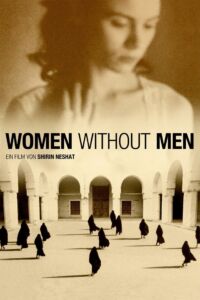 The magical-realist Women Without Men follows the fortunes of four women against the backdrop of the 1953 coup that allowed the shah to continue his despotic rule. The four women meet regularly in an orchard, where they hold parties, sing and talk freely about any subject. Shirin Neshat filmed Shahrnush Parsipur’s novel, banned in Iran, to international success, including the Silver Lion for best director at the 2009 Venice Film Festival.
The magical-realist Women Without Men follows the fortunes of four women against the backdrop of the 1953 coup that allowed the shah to continue his despotic rule. The four women meet regularly in an orchard, where they hold parties, sing and talk freely about any subject. Shirin Neshat filmed Shahrnush Parsipur’s novel, banned in Iran, to international success, including the Silver Lion for best director at the 2009 Venice Film Festival.
Newsletter
Do you want to stay up to date with all Movies that Matter news, promotions and special screenings? Sign up for our newsletter (in Dutch).
Subscribe to our English Industry newsletter or Educational newsletter (in Dutch) here